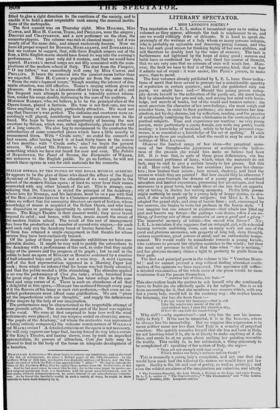ITALIAN OPERAS, BY THE PUPILS OF THE ROYAL MUSICAL ACADEMY.
IT appears to be the plan of those who direct the affairs of the Royal Academy of Music, to limit the education of its vocal pupils to the school of the modern Italian opera : at least we never hear their names connected with any other branch of the art. This is strange, con- sidering that Dr. CROTCH is styled the principal of the Academy; .whose love for Itossim, and his imitators, must be on a par with that of the Resi..iiIDWARD IRVING for a Christmas pantomime. -However, hen we reflect that the managing directors are men of fashion, whose nowledge of music is acquired at the Italian Opera, and who have o disposition or perhaps opportunity to extend it, our wonder may ease. The King's Theatre is their musical world; they never travel eyond its orbit ; and hence, with them, music means the music of he modem Italian school. The result of this sort of management as been the production of a number of second-rate singers,—for such nd such only can the Academy boast of having furnished. Not one f them has retained a single engagement in that theatre for whose ervice they have been exclusively trained. Of the policy of these juvenile dramatic exhibitions we have con- iderable doubts. It might be very well to gratify the subscribers to he Academy with a performance of this sort, in order that they might udge of the powers and the progress of its pupils ; but to call in the ublic to hear an opera of MOZART or ROSSINI sustained by a number f half-educated boys and girls, is not a wise step. A most vigorous uff of the first representation appeared in a Morning Paper last week ; from which we inferred that the house was but thinly attended, ind that the public needed a little stimulating. The stimulus applied 0 us was the performance of Cosi fan tutte; which, banished from he great stage of the King's Theatre, has taken refuge in this con- ned and snug corner of it. There is such an abundance of all that
delightful in this opera,—MOZART has scattered through every page f it the flowers of his fancy in such rich profusion,—that even an im- erfect performance must afford some gratification. We can " piece ut the imperfections with our thoughts," and supply the deficiencies f the singers by the help of our imagination. The performance may be characterized as the respectable attempt of ome juvenile artists. The instrumental part of the band was superior
o the vocal. We were at first surprised to hear how well the wind struments were played ; but our surprise ended on observing among the pupils of the Academy," (of whom the orchestra was announced s being entirely composed,) the welcome countenances of WILLMAN .nd MAC ICI NTOSH ! A detailed criticism on the opera is not necessary. e will only express our hope that, having forced its way into a corner f the King's Theatre, and having shown, even by such an imperfect epresentation, its powers of attraction, Cosi fan tutte may be flowed to find in the body of the house an adequate development of s beauties.


















 Previous page
Previous page